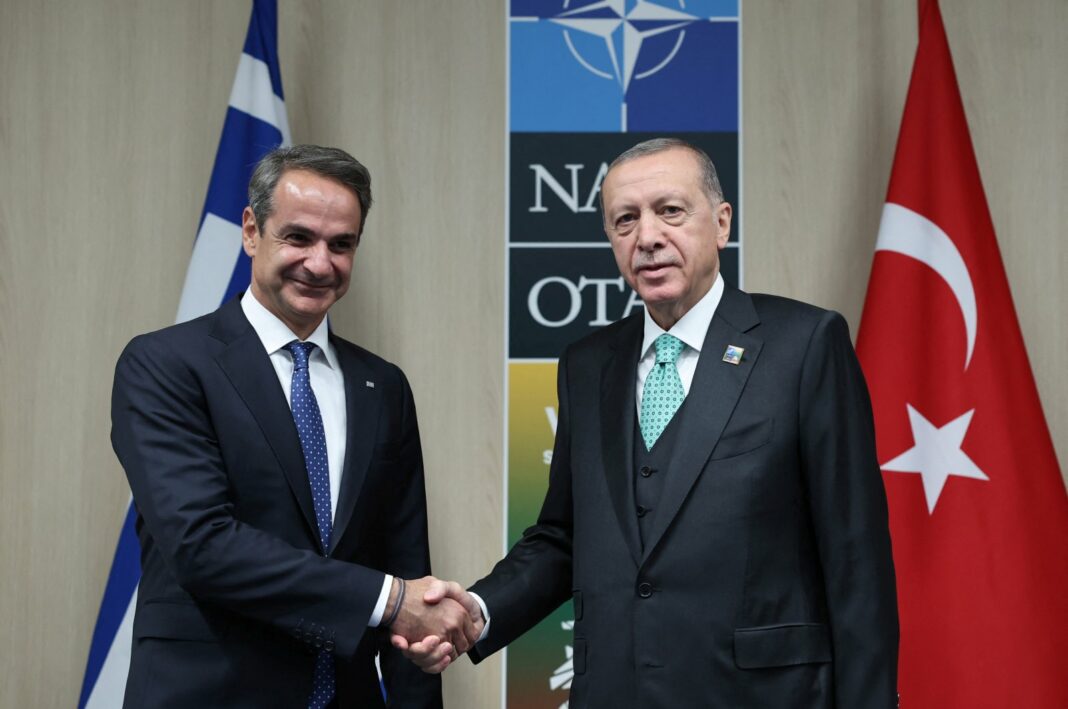The leaders of Greece and Turkey on Wednesday pledged to build on a “positive momentum” in a restart of strained relations prompted by cooperation following this year’s deadly earthquakes, Agence France-Presse reported.
It marks a turn for the two uneasy NATO neighbors that have long feuded over maritime borders and energy exploration rights in disputed parts of the Aegean and eastern Mediterranean.
Greek Prime Minister Kyriakos Mitsotakis and Turkish President Recep Tayyip Erdoğan “agreed that it is to the benefit of both countries that the positive climate formed in bilateral relations over recent months has continuity and consistency,” a statement issued by both their offices said.
“To this end, the two sides agreed to build on the positive momentum and activate multiple channels of communication between the two countries in the coming period,” the statement said.
The next round of talks between officials will be held in Thessaloniki in the fall, it said.
Erdoğan and Mitsotakis, who were re-elected in May and June, respectively, had a one-hour meeting on the sidelines of a NATO summit in Vilnius, Lithuania.
“We are cautiously optimistic that we can start on a new page,” Mitsotakis told reporters after the meeting.
“With mutual gestures of goodwill, we can defuse possible sources of future tension,” he said.
Mitsotakis added that he had “no reason to doubt the sincerity” of Erdoğan, albeit noting that the “turn” in the Turkish leader’s formerly aggressive tone could be interpreted as “possibly adapting to reality.”
‘Earthquake diplomacy’
Erdoğan had hosted a March 2022 meeting with Mitsotakis in Istanbul, but the relationship rapidly soured in the following months as the Turkish leader stepped up verbal attacks on Athens.
Erdoğan accused Greece of “occupying” Aegean islands, whose status was settled in post-war treaties, and warned that Turkey’s armed forces could “come overnight” and “do what is necessary.”
At their last encounter in Prague in October, the pair had a verbal spat when Erdoğan reportedly said Athens was raising tension in the region with provocative actions.
Erdoğan at the time claimed that Mitsotakis had stormed out of the official dinner of an informal European summit.
But the rhetoric was toned down in February when Greece sent aid and rescue teams in the wake of a massive earthquake that killed more than 50,000 people.
Greece’s then-foreign minister Nikos Dendias was also the first European minister to visit Turkey after the quake.
“We have no strategic benefit in having Turkey at odds with the West, the EU and the United States,” Mitsotakis told reporters Wednesday.
He acknowledged that the earthquake cooperation “brought many changes in the psychology” of Greek-Turkish relations.
What is known in the two nations as “earthquake diplomacy” also came into play in 1999 when two deadly quakes struck Turkey and Greece within a month of each other.
It brought about a thaw in relations just three years after the NATO allies had nearly gone to war over an uninhabited islet in the Aegean Sea.



